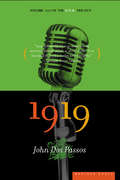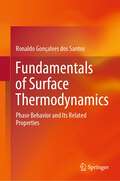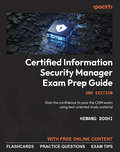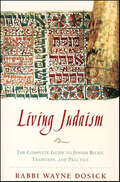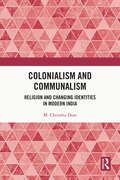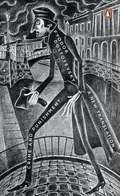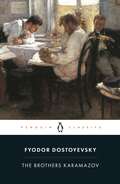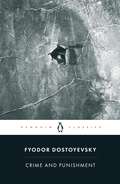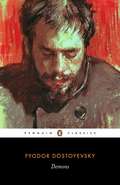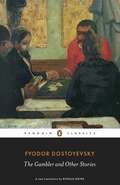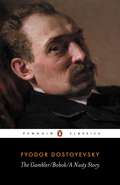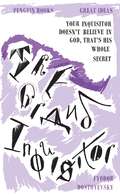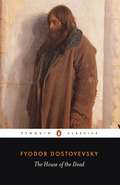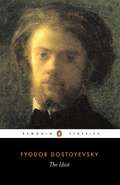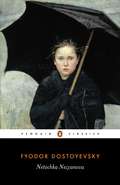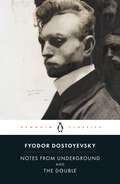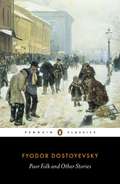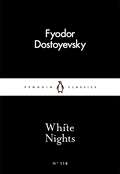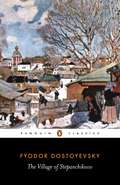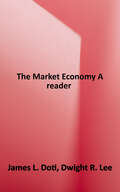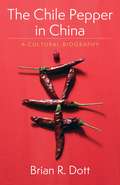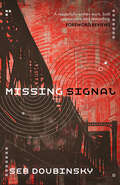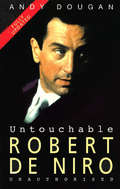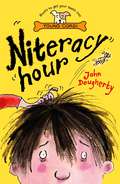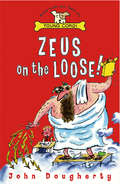- Table View
- List View
1919: The Complete Trilogy [the 42nd Parallel, 1919, And The Big Money] (U.S.A. Trilogy #2)
by John Dos Passos&“A Depression-era novel about American tumult has—perhaps unsurprisingly—aged quite well.&”—The New YorkerIn 1919, the second volume of his U.S.A. trilogy, John Dos Passos continues his &“vigorous and sweeping panorama of twentieth-century America&” (Forum).Employing a host of experimental devices that would inspire a whole new generation of writers to follow, Dos Passos captures the many textures, flavors, and background noises of the era with a cinematic touch and unparalleled nerve.1919 opens to find America and the world at war, and Dos Passos&’s characters, many of whom we met in the first volume, are thrown into the snarl. We follow the daughter of a Chicago minister, a wide-eyed Texas girl, a young poet, and a Jewish radical, and we get glimpses of Woodrow Wilson, Theodore Roosevelt, and the Unknown Soldier.Named one of the Modern Library&’s 100 best English-language novels of the twentieth century, &“U.S.A. is a masterpiece&” (Tim O&’Brien) and 1919 is an unforgettable chapter in the saga. &“It&’s the kind of book a reader never forgets.&”—Chicago Daily Tribune
Fundamentals of Surface Thermodynamics: Phase Behavior and Its Related Properties
by Ronaldo Gonçalves dos SantosInterfacial phenomena play a crucial role in various industrial processes and daily operations. These phenomena are related to the formation of emulsions and foams, adsorption on solid and fluid interfaces, wettability alteration, and others that strongly impact the quality and cost of products and processes. Understanding the interfacial phenomena encompasses inexorably the description of surface thermodynamics and the assessment of thermodynamic properties. The book Fundamentals of Surface Thermodynamics introduces the basics of the thermodynamics of interface from a perspective of chemical engineering thermodynamics and surface chemistry. It provides insights into real-life phenomena, emphasizing the practical significance of abstract properties routinely dealt with by scientists and engineers. The book is tailored for both graduate and undergraduate courses in chemistry and engineering schools. The book content is particularly beneficial for industry professionals involved in oil & gas, fluid transportation, nanotechnology, and other operations with multiphase complex systems, where the process effectiveness is affected by interfacial phenomena.The Fundamentals of Surface Thermodynamics brings a comprehensive description of colloidal science, ranging from conventional surfactant applications to responsive systems and nanomaterials applied to life science. The author invites the reader on a journey into the fascinating world where small-dimension entities breathe. The book aims to inspire students and professionals to delve deep into the intricacies of interface thermodynamics, thereby contributing to supporting education activities and enabling industrial solutions.
Certified Information Security Manager Exam Prep Guide: Gain the confidence to pass the CISM exam using test-oriented study material, 2nd Edition
by Hemang DoshiMaster information security fundamentals with comprehensive explanations of concepts.Purchase of the book unlocks access to web-based tools like practice questions, flashcards, and more to take your CISM prep to the next level.Purchase of the print or Kindle book includes a free eBook in PDF format.Key FeaturesUse this comprehensive resource to prepare for ISACA's CISM certificationUnlock free online tools including interactive practice questions, exam tips, and flashcards to effectively prepare for the CISM examUnderstand the theory behind information security program development and managementBook DescriptionCISM is a globally recognized and much sought-after certification in the field of IT security. This second edition of the Certified Information Security Manager Exam Prep Guide is up to date with complete coverage of the exam content through comprehensive and exam-oriented explanations of core concepts. Written in a clear, succinct manner, this book covers all four domains of the CISM Review Manual.With this book, you'll unlock access to a powerful exam-prep platform which includes interactive practice questions, exam tips, and flashcards. The platform perfectly complements the book and even lets you bring your questions directly to the author.This mixed learning approach of exploring key concepts through the book and applying them to answer practice questions online is designed to help build your confidence in acing the CISM certification.By the end of this book, you'll have everything you need to succeed in your information security career and pass the CISM certification exam with this handy, on-the-job desktop reference guide.What you will learnUnderstand core exam objectives to prepare for the CISM exam with confidenceGet to grips with detailed procedural guidelines for effective information security incident managementExecute information security governance in an efficient mannerStrengthen your preparation for the CISM exam using interactive flashcards and practice questionsConceptualize complex topics through diagrams and examplesFind out how to integrate governance, risk management, and compliance functionsWho this book is forIf you're an IT professional, IT security officer, or risk management executive looking to upgrade your career by passing the CISM exam, this book is for you. Basic familiarity with information security concepts is required to make the most of this book.
Living Judaism: The Complete Guide to Jewish Belief, Tradition, and Practice
by Wayne D. DosickIn Living Judaism, Rabbi Wayne Dosick, Ph.D., author the acclaimed Golden Rules, Dancing with God, and When Life Hurts, offers an engaging and definitive overview of Jewish philosophy and theology, rituals and customs. Combining quality scholarship and sacred spiritual instruction, Living Judaism is a thought-provoking reference and guide for those already steeped in Jewish life, and a comprehensive introduction for those exploring the richness and grandeur of Judaism.
Colonialism and Communalism: Religion and Changing Identities in Modern India
by M. Christhu DossChristhu Doss examines how the colonial construct of communalism through the fault lines of the supposed religious neutrality, the hunger for the bread of life, the establishment of exclusive village settlements for the proselytes, the rhetoric of Victorian morality, the booby-traps of modernity, and the subversion of Indian cultural heritage resulted in a radical reorientation of religious allegiance that eventually created a perpetual detachment between proselytes and the “others.”Exploring the trajectories of communalism, Doss demonstrates how the multicultural Indian society, known widely for its composite culture, and secular convictions were categorized, compartmentalized, and communalized by the racialized religious pretensions. A vital read for historians, political scientists, sociologists, anthropologists, and all those who are interested in religions, cultures, identity politics, and decolonization in modern India.
Crime and Punishment
by Fyodor Dostoevsky'A truly great translation . . . This English version really is better' - A. N. Wilson, The SpectatorTIMES LITERARY SUPPLEMENT BOOKS OF THE YEAR 2014This acclaimed new translation of Dostoyevsky's 'psychological record of a crime' gives his dark masterpiece of murder and pursuit a renewed vitality, expressing its jagged, staccato urgency and fevered atmosphere as never before. Raskolnikov, a destitute and desperate former student, wanders alone through the slums of St. Petersburg, deliriously imagining himself above society's laws. But when he commits a random murder, only suffering ensues. Embarking on a dangerous game of cat and mouse with a suspicious police investigator, Raskolnikov finds the noose of his own guilt tightening around his neck. Only Sonya, a downtrodden prostitute, can offer the chance of redemption.Fyodor Dostoevsky (1821-1881) was born in Moscow and made his name in 1846 with the novella Poor Folk. He spent several years in prison in Siberia as a result of his political activities, an experience which formed the basis of The House of the Dead. In later life, he fell in love with a much younger woman and developed a ruinous passion for roulette. His subsequent great novels include Notes from Underground, Crime and Punishment, The Idiot, Demons and The Brothers Karamazov.Oliver Ready is Research Fellow in Russian Society and Culture at St Antony's College, Oxford. He is general editor of the anthology, The Ties of Blood: Russian Literature from the 21st Century (2008), and Consultant Editor for Russia, Central and Eastern Europe at the Times Literary Supplement.
The Brothers Karamazov
by Fyodor Dostoyevsky'The most magnificent novel ever written' Sigmund FreudThe murder of brutal landowner Fyodor Karamazov changes the lives of his sons irrevocably: Mitya, the sensualist, whose bitter rivalry with his father immediately places him under suspicion for parricide; Ivan, the intellectual, driven to breakdown; the spiritual Alyosha, who tries to heal the family's rifts; and the shadowy figure of their bastard half-brother, Smerdyakov. Dostoyevsky's dark masterwork evokes a world where the lines between innocence and corruption, good and evil, blur, and everyone's faith in humanity is tested.Translated with an Introduction and notes by DAVID McDUFF
Crime and Punishment
by Fyodor Dostoyevsky'Dostoyevsky's finest masterpiece' John BayleyDostoyevsky's great novel of damnation and redemption evokes a world where the lines between innocence and corruption, good and evil, blur. It tells the story of Raskolnikov, a destitute and desperate former student, who wanders through the slums of St Petersburg and commits a random murder without remorse or regret. He imagines himself to be beyond conventional moral laws. But as he embarks on a dangerous game of cat and mouse with a police investigator, Raskolnikov is pursued by the growing voice of his conscience and finds the noose of his own guilt tightening around his neck. Translated with an Introduction and notes by DAVID McDUFF
Demons
by Fyodor DostoyevskyPyotr and Stavrogin are the leaders of a Russian revolutionary cell. Their aim is to overthrow the Tsar, destroy society and seize power for themselves. Together they train terrorists who are willing to go to any lengths to achieve their goals – even if the mission means suicide. But when it seems the group is about to be discovered, will their recruits be willing to kill one of their own circle in order to cover their tracks? Partly based on the real-life case of a student murdered by his fellow revolutionaries, Dostoyevsky’s sprawling novel is a powerful and prophetic, yet lively and often comic depiction of nineteenth-century Russia, and a savage indictment of the madness and self-destruction of those who use violence to serve their beliefs
The Gambler and Other Stories
by Fyodor DostoyevskyThe Gambler and Other Stories is Fyodor Dostoyevsky's collection of one novella and six short stories reflecting his own life - indeed, 'The Gambler', a story of a young tutor in the employment of a formerly wealthy Russian General, was written under a strict deadline so he could pay off his roulette debts. This volume includes 'Bobok', the tale of a frustrated writer visiting a cemetery and enjoying the gossip of the dead; 'The Dream of a Ridiculous Man', the story of one man's plan to commit suicide and the troubling dream that follows, as well as 'A Christmas Party and a Wedding', 'A Nasty Story' and 'The Meek One'.
The Gambler, Bobok, A Nasty Story
by Fyodor DostoyevskyThe stories in this volume demonstrate Dostoyevsky's genius for fusing caricature, irony and the grotesque to create a powerful dark humour. The Gambler is a breathtaking portrayal of an intense and futile obsession. Based on Dostoyevsky's own experience of financial desperation and the compulsive desire to win money, it focuses on the characters that take their places at the gaming tables of 'Roulettenburg': the outspoken, aristocratic 'Grandmamma', the mercenary Mademoiselle Blanche, the cool, mysterious Polina and Alex, the author's self-portrait; a man gripped by exhilaration and hopelessness. Bobok is a blackly comic satire in which a desolate writer becomes drawn into the conversations of the dead, and A Nasty Story is a humorous look at the disparity between a man's exaggerated ideal of himself and the sad reality.
The Grand Inquisitor: A Graphic Novel Based On The Story From Fyodor Dostoyevsky's The Brothers Karamazov
by Fyodor DostoyevskyVividly imagining the second coming and capture of Christ during the time of the Spanish Inquisition, this parable recounted in The Brothers Karamazov is a profound, nuanced exploration of faith, suffering, human nature and free will. Included here too are Dostoyevsky's powerful and disturbing writings about his time in exile at a Siberian prison camp.Throughout history, some books have changed the world. They have transformed the way we see ourselves - and each other. They have inspired debate, dissent, war and revolution. They have enlightened, outraged, provoked and comforted. They have enriched lives - and destroyed them. Now Penguin brings you the works of the great thinkers, pioneers, radicals and visionaries whose ideas shook civilization and helped make us who we are.
The House of the Dead
by Fyodor DostoyevskyIn January 1850 Dostoyevsky was sent to a remote Siberian prison camp for his part in a political conspiracy. The four years he spent there, startlingly re-created in The House of the Dead, were the most agonizing of his life. In this fictionalized account he recounts his soul-destroying incarceration through the cool, detached tones of his narrator, Aleksandr Petrovich Goryanchikov: the daily battle for survival, the wooden plank beds, the cabbage soup swimming with cockroaches, his strange ‘family’ of boastful, ugly, cruel convicts. Yet The House of the Dead is far more than a work of documentary realism: it is also a powerful novel of redemption, describing one man’s spiritual and moral death and the miracle of his gradual reawakening.
The Idiot
by Fyodor DostoyevskyInspired by an image of Christ's suffering, Dostoyevsky set out to create a protagonist with "a truly beautiful soul" and to trace the fate of such an individual as he comes into contact with the brutal reality of contemporary society. The novel begins when the innocent epileptic Prince Myshkin - the 'idiot' - arrives in St Petersburg and finds himself drawn into a web of violent and passionate relationships that leads to blackmail, betrayal and eventually murder.
Netochka Nezvanova
by Fyodor DostoyevskyNetochka Nezvanova - a 'Nameless Nobody' - tells the story of a childhood dominated by her stepfather, Efimov, a failed musician who believes he is a neglected genius. The young girl is strangely drawn to this drunken ruin of a man, who exploits her and drives the family to poverty. But when she is rescued by an aristocratic family, the abuse against Netochka's delicate psyche continues in a more subtle way, condemning her to remain an outsider - a solitary spectator of a glittering society. Conceived as part of a novel on a grand scale, Netochka Nezvanova remained incomplete after Dostoyevsky was exiled to Siberia for 'revolutionary activities' in 1849. With its depiction of the suffering, loneliness, madness and sin that affect both rich and poor in St Petersburg, it contains the great themes that were to dominate his later novels.
Notes from Underground and the Double
by Fyodor Dostoyevsky'That sense of the meaninglessness of existence that runs through much of twentieth-century writing - from Conrad and Kafka, to Beckett and beyond - starts in Dostoyevsky's work' Malcolm BradburyAlienated from society and paralysed by a sense of his own insignificance, the anonymous narrator of Dostoyevsky's Notes from Underground tells the story of his tortured life. With bitter irony, he describes his refusal to become a worker in the 'anthill' and his gradual withdrawal from society. The seemingly ordinary world of St Petersburg takes on a nightmarish quality in The Double when a government clerk encounters a man who looks exactly like him - his double perhaps, or possibly the darker side of his own personality. Like Notes from Underground, this is a masterly tragi-comic study of human consciousness.Translated by Ronald Wilks with an Introduction by Robert Louis Jackson
Poor Folk and Other Stories
by Fyodor DostoyevskyWith their penetrating psychological insight and their emphasis on human dignity, respect and forgiveness, Dostoyevsky's early short stories contain the seeds of the themes that came to his major novels. Poor Folk, the author's first great literary triumph, is the story of a tragic relationship between an impoverished copy clerk and a young seamstress, told through their passionate letters to each other. In The Landlady Dostoyevsky portrays a dreamer hero who is captivated by a curious couple and becomes their lodger. Mr Prokharchin, inspired by a true story, is a sly comedy centring on an eccentric miser, and Polzunkov is a powerful character sketch which, in common with the other tales in this volume, questions the very nature of existence.
White Nights (Penguin Little Black Classics)
by Fyodor Dostoyevsky'My God! A whole minute of bliss! Is that really so little for the whole of a man's life?'A poignant tale of love and loneliness from Russia's foremost writer.One of 46 new books in the bestselling Little Black Classics series, to celebrate the first ever Penguin Classic in 1946. Each book gives readers a taste of the Classics' huge range and diversity, with works from around the world and across the centuries - including fables, decadence, heartbreak, tall tales, satire, ghosts, battles and elephants.
The Village of Stepanchikovo: And its Inhabitants: from the Notes of an Unknown
by Fyodor Dostoyevsky Ignat AvseySummoned to the country estate of his wealthy uncle Colonel Yegor Rostanev, the young student Sergey Aleksandrovich finds himself thrown into a startling bedlam. For as he soon sees, his meek and kind-hearted uncle is wholly dominated by a pretentious and despotic pseudo-intellectual named Opiskin, a charlatan who has ingratiated himself with Yegor’s mother and now holds the entire household under his thumb. Watching the absurd theatrics of this domestic tyrant over forty-eight explosive hours, Sergey grows increasingly furious - until at last, he feels compelled to act. A compelling comic exploration of petty tyranny, The Village of Stepanchikovo reveals a delight in life’s wild absurdities that rivals even Gogol’s. It also offers a fascinating insight into the genesis of the characters and situations of many of Dostoyevsky’s great later novels, including The Idiot, Devils and The Brothers Karamazov.
The Market Economy: A Reader
by James L. Doti Dwight R. LeeThe Market Economy: A Reader outlines the characteristics and philosophical underpinnings of the market economy and its usefulness in the allocation of resources. This anthology offers a comprehensive set of authentic, primary source selections that demonstrate how the tenets of classical economic liberalism provide the foundation for an efficient economic system--while also maximizing individual freedom. The readings also provide a structure for analyzing economic and philosophical issues. The book includes selections from several authors who are not economists but whose work is important in terms of their contribution to economic thought, such as Henry David Throeau and Ayn Rand. It also features classic readings such as Adam Smith's invisible hand from his Wealth of Nations, David Ricardo's original explanation of comparative advantage from Principles of Political Economy and Taxation, and John Stuart Mill's eloquent expression of the limits of government in On Liberty. Latter-day proponents of private enterprise include Friedrich Hayek, Ludwig von Mises, and Milton Friedman. These authors and others address how the market economy responds to such topical issues as the environment, income distribution, and free trade.
The Chile Pepper in China: A Cultural Biography (Arts and Traditions of the Table: Perspectives on Culinary History)
by Brian R. DottChinese cuisine without chile peppers seems unimaginable. Entranced by the fiery taste, diners worldwide have fallen for Chinese cooking. In China, chiles are everywhere, from dried peppers hanging from eaves to Mao’s boast that revolution would be impossible without chiles, from the eighteenth-century novel Dream of the Red Chamber to contemporary music videos. Indeed, they are so common that many Chinese assume they are native. Yet there were no chiles anywhere in China prior to the 1570s, when they were introduced from the Americas.Brian R. Dott explores how the nonnative chile went from obscurity to ubiquity in China, influencing not just cuisine but also medicine, language, and cultural identity. He details how its versatility became essential to a variety of regional cuisines and swayed both elite and popular medical and healing practices. Dott tracks the cultural meaning of the chile across a wide swath of literary texts and artworks, revealing how the spread of chiles fundamentally altered the meaning of the term spicy. He emphasizes the intersection between food and gender, tracing the chile as a symbol for both male virility and female passion. Integrating food studies, the history of medicine, and Chinese cultural history, The Chile Pepper in China sheds new light on the piquant cultural impact of a potent plant and raises broader questions regarding notions of authenticity in cuisine.
Missing Signal
by Seb DoubinskyFrom Seb Doubinsky, author of The Song of Synth, The Babylonian Trilogy, White City, Absinth, Omega Gray and Suan Ming, comes his highly anticipated next installment in the City-States Cycle.Missing Signal—a riddle wrapped in a mystery inside a government conspiracy? Agent Terrence Kovacs has worked for the New Petersburg Counter-Intel Department propagating fake UFO stories for so long that even he has a hard time separating fact from fiction. Especially when he's approached by a beautiful woman named Vita, who claims she's been sent from another planet to liberate Earth.
Untouchable: Unauthorised
by Andy DouganAndy Dougan draws on first-hand interviews with some of De Niro's closest friends and colleagues. The result is a revealing and sometimes startling account of an intensely private man. While previous biographies of De Niro have only scraped the surface of his complex character, this sensitive and perceptive portrayal lays bare the psychological and emotional scars that De Niro has sought to hide for so long.
Niteracy Hour
by John DoughertyWHAT A LOUSE! Jim is a head-louse, newly-hatched from a nit on Gregory's head. But as Gregory is a good listener and it's 'in his blood', Jim's breakfast turns him into a good listener too and suddenly school storytime changes from Literacy Hour to Niteracy Hour. And can Jim help Gregory do something about Duncan, the class bully? He's the real louse in the class-
Zeus On The Loose (Zeus #1)
by John DoughertyI am the great and mighty Zeus, mortal- give me one good reason why I shouldn't smite you here and now!'Alex's class are learning about the Ancient Greeks. That's why Alex makes a temple (out of loo rolls and a cornflakes box) for the Greek god Zeus. He doesn't expect the god himself to turn up, borrow his mum's nightie and demand a sacrifice at half-past five in the morning. Even worse, Zeus reckons it's time for another Trojan War - in the school playground! Zeus is on the loose-
